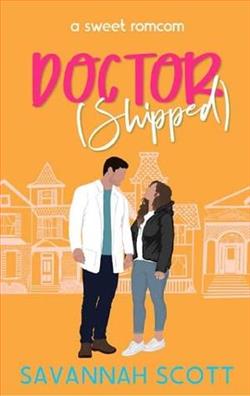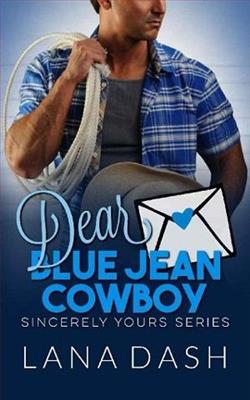Page 17 of Justice & Liberty
Heck, I didn’t even like mushrooms.
I had just set the books on the counter with the tea when a noise caught my attention. A knock on the front door. I turned and had to blink against the bright light coming in the front windows, since the back of the shop was quite a bit darker, but after a moment, I recognized Mom’s lawyer, Martin Hayes.
I sighed and went over to unlock the door.
This was the problem with the shop. People assumed that just because I was in there, it meant they had a right to bother me.
I motioned the man in and relocked the door behind him. He was in his sixties at least, probably nearing seventy, and I’d been expecting him to retire since my childhood. I’d also never much liked him—too stiff, his face in a constant expression of displeasure. But he wasn’t my lawyer, he was Mom’s.
On the other hand, he was the only lawyer in South Liberty, so there was that.
I’d find one in Iowa City, I decided in that moment, watching him take off his gloves and fold them neatly before tucking them into a pocket. It was March, for fuck’s sake. Who was still wearing gloves? They were probably driving gloves, like he was a hundred years old and expected the old timey steering wheel in his Model T to slide right out of his grip.
He surveyed the shop for a moment, and something about the assessing expression set my teeth on edge.
My shop. Mine.
Which was a bit feral as positions went, particularly sinceI’d spent much of the morning wondering if the place was more trouble than it was worth to me.
Hayes gave me a grim smile as he finally turned back to me. He reached into his suit jacket and retrieved a large manila envelope. “Sorry to bother you,” he said, inclining his head. “I’m sure you have quite a bit of work to do, after Mrs. Abernathy’s sudden death.”
Mrs., even though Mom had never married, and had been nothing resembling a Mrs. to anyone. He might as well have just referred to her as Madame Abernathy, the title was so stiff and nonsensical.
No reason to bother explaining all that to him, though.
“I suppose I do,” I agreed, still unwilling to get into a conversation about what I intended to do with the shop. “Can I help you with something, Mr. Hayes?” I pointedly looked at the envelope.
I didn’t want to be rude, but I just wanted to take care of whatever he wanted and get rid of him, so I could get back to what I’d been doing. Or literally anything else.
“Of course, of course. Just some last paperwork on the estate. It’s not a farm or anything, so no millions of dollars in equipment. Nothing that will take too long.” He opened the folder, flipping through the pages. “You were her only beneficiary, of course, so anything that remains will go to you, as I’m sure you’re aware. I’ll just need you to sign off on this.”
He stopped on the last page and tapped on an empty signature line, then tugged a pen out of his top pocket, holding it out to me.
I stepped forward and looked at the page he wanted me to sign. There was nothing on it, really, no information about Mom or the estate or anything. No, whatever it was, the full document was about ten pages long, and I didn’t doubt, in legalese.
My friend Teresa was a lawyer, and things couldn’t be sodifferent in Australia than the US, could they? I’d take pictures of the pages and send them to her, ask her to read them over before I went signing anything. I smiled at him and flipped the papers back into a single pile. “Thank you, Mr. Hayes. I’ll give these a read and get them back to you as soon as I can.”
His smile went a little flat, and he sighed. “Miss Abernathy?—”
“Jones.”
That, too, got me a sigh, as it so often did. “Miss Jones, then. You understand I can’t set things into motion for you to receive your inheritance until you sign the paperwork? Technically, you shouldn’t even be in here. Or in Mrs. Abernathy’s home.”
I lifted a brow at him. “I’m not sure how much better I can help you out here, Mr. Hayes. I’ll sign the document as soon as I’ve read through it. If you’d like to try to kick me out of my childhood home in the meantime?—”
“Of course not,” he said, sighing like I was just too dramatic and annoying for words. “I’d simply like to get this handled as soon as possible. I’m sure you know my payment is tied up in the estate as well.”
That? Well fuck him, honestly. “Sorry my mother’s death has been so inconvenient for you. Like I said, I’ll handle it as soon as possible and then I’ll drop into your office. I’m sure it won’t take long.”
He looked aghast at my bluntness, and like he wanted nothing so much as to snatch the papers back and run off. It was so Midwestern, and frankly, the biggest part of Midwestern life I had not missed. Politeness mattered more than kindness, and openly showing emotions was like growing a second head.
Well, the people of South Liberty had mostly been fine with Mom being blunt and unafraid of her emotions, so theywould learn to deal with me being the same. I’d learned it from her, after all.
He pursed his lips, glancing back down at the papers and up at me, but sighed and nodded, turning to leave.
I walked him over, since I had to unlock the door for him and then lock it again behind him, but neither of us said another word as he left. Thank fuck. I didn’t want to really lose my temper with an old man.
Maybe no one in town knew Mom was a witch and they might take issue if they did, but getting a reputation as a bitch, well...that was another thing entirely, and like Hunter had said, not good for business.















